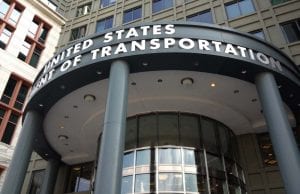When passenger fines for being drunk are higher than airline fines for fleecing thousands of passengers, something is wrong

Something has gone wrong when an individual from Haiti is fined more than an airline that broke federal law. The airline action affected tens of thousands of passengers. The drunk individual only affected a handful of passengers. Plus, these extraordinary punitive fines against individuals make airline fines with their consent orders absolutely unfair.
Airlines are holding more than $10 billion in airline flight credits
According to a story in the Wall Street Journal, the big four airlines — American, Delta, United, and Southwest — are holding $10 billion in airline credits. Some of the airlines lied to their passengers and insisted that only flight credits would be refunded instead of cash. Another airline changed its contract of carriage repeatedly and told passengers new rules applied. Until DOT reminded it that a contract is only valid if it was in place when the ticket was purchased.
Do you think that the airlines have been fined at all? Before you spend too much time thinking about this, the answer is, “No.” However, travelers pay higher fines than airlines. During the pandemic, passengers have been assessed at least $63,000. Airlines have been fined nothing for not refunding passengers’ airfares when flights were canceled.
DOT enforcement office claims that its main efforts are to get money back into passengers’ hands.
However, there should be consequences for breaking federal laws.
All in all, the refund complaints increased by more than 5,000 percent as of October. Fare complaints increased 171 percent. And, reservation irritations reported by consumers rose 141 percent.
Even with the number of complaints and the obvious refusal by many airlines to refund airfares, no enforcement fines were issued. Still, none have been issued.
During the emergency, DOT faced a problem of getting money back in passengers’ hands as quickly as possible. They could have fined airlines or taken them to court. However, the time needed to go through those processes would delay real justice — getting money back in consumers’ hands.
I believe DOT when they claim that the money should go to getting refunds to passengers. However, fining individuals more than $30,000, $16,000, and $14,500 is simply wrong.
This lack of DOT enforcement for more than two years is shameful and unacceptable

Travelers United heard many reasons about why no DOT airline fines are on the books after more than two years since the declaration of the pandemic. But, Travelers United heard from hundreds of consumers. And, DOT heard from almost 100,000 passengers fleeced by the airlines during the last year.
Travelers pay higher fines than airlines and airlines, based on total income, pay only pennies.
Back in 2018, I analyzed the size of airline fines vis-a-vis consumer income. Back then, the differences were staggering. The differences have only grown more amazing.
Travelers United has taken the total income of the airlines and divided it into the DOT fine amounts. Total DOT fines came out to $3,215,000. Later, we compared those fine percentages against the average annual US household income of $80,000.
American Airlines was assessed a DOT fine of $250,000 for “failing to timely process refunds for air transportation with credit cards.” This would be the equivalent of fining the average American household only 59¢.
In 2017, Delta Air Lines was fined a total of $410,000 by the Department of Transportation for various violations. These total fines registered at .0000099 percent of their total income or .0001146 of their profits. The Delta Air LInes total 2017 fines were the equivalent of an 80¢ fine for the average American household.
United Airlines paid no fine for the Dr. Dao denied boarding incident. However, the airline received a DOT fine of $80,000 for failing to properly report the death of animals aboard its flights. This error made United Airlines appear to be twice as effective at transporting animals without incident. The total United Airlines fine for 2017 was the equivalent of a 17¢ fine for the average American household.
Let’s hope that DOT’s enforcement division sees its way to fining airlines for keeping passengers’ money unlawfully. Consumers are still waiting.
Enforcement of unruly passenger events goes beyond only fines. Simple Flying reported that a passenger was given a 15-month jail sentence.
Vyvianna Quinonez apologized in court and her lawyers sought time served (she has been on remand since the DUI incident in March). Prosecutors wanted four months inside. But Judge Robinson thought both options insufficient. He slapped Ms Quinonez with 15 months of jail time, three years of supervised release, a US$7,500 fine, nearly $26,000 in restitution, compulsory anger management and counseling classes, and banned her from flying on commercial airlines in the US.
To date, no airline has been fined for breaking laws and regulations during the pandemic. Now passengers have been fined more than any airline and sent to serve jail time. Airline consumers are waiting for action taken against the airlines for their violations. Perhaps some jail time for executives will show the judicial system’s enforcement seriousness.
READ ALSO:
How the death of guidebooks changes the way we travel
The 24-hour rule: You have a full day to correct mistakes

Charlie Leocha is the President of Travelers United. He has been working in Washington, DC, for the past 14 years with Congress, the Department of Transportation, and industry stakeholders on travel issues. He was the first consumer representative to the Advisory Committee for Aviation Consumer Protections appointed by the Secretary of Transportation from 2012 through 2018.



